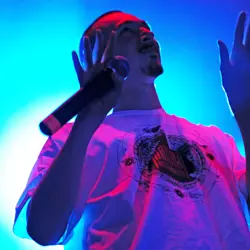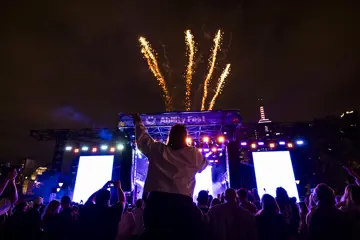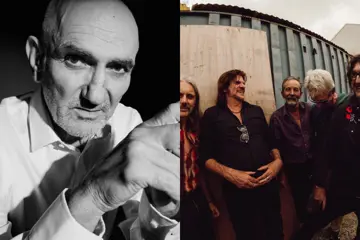 The Tongue
The Tongue"This personality of the rapper and the personality of the teacher, which is also a part of me – those two worlds don't necessarily blend,” says Xannon with a very serious tone. He's in the throes of teaching prac as he finishes his Master's, while simultaneously preparing for an Australian tour to promote his new record, Surrender To Victory. “I'm not really sure what my co-workers think I do. It's a strange life and I'm wondering how these two things are gonna work side by side. What's the point of having a life that's not boring and strange I guess?”
Of course there's no need to explain the long history of hip hop's legacy as an instrument for education to Xannon. His knowledge and grasp on hip hop's legacy is as impressive as his own gift of the gab, and he says he's been learning from hip hop himself since way back in the beginning. Still, like most progressive musical preferences, it's as much about defying authority, and herein lies his dilemma.
“Public Enemy were the first group that really influenced me a lot, and yeah, when you're listening to it, it's great music but you're also learning at the same time,” he says. “And that goes with most of the great hip hop; you're at least learning someone's point of view if it's biographical. Public Enemy called hip hop the CNN of the 'hood. At the same time, hip hop is about rebellion and saying 'fuck the system' and teaching is about being the system,” he laughs, “so that side of things is difficult. I've got this idea about writing a short course, and I'd like to teach hip hop is ultimately what I'd like to do. It touches on a lot of different things like literature, poetry – it's historical and it's relevant to the kids. If it's not relevant they're not interested and they don't learn.”
But it's not just the greats of the past in the US who tackled political issues, and Xannon references a much more recent track to show that the idea of dissonance and protest is not absent from even some of today's more commercial hip hop acts. He cites the track Ronald Reagan by Killer Mike as a modern example of how some US hip hop artists are still using hip hop to tell the truth, and even analyse it in a historical context.
Don't miss a beat with our FREE daily newsletter
“It was like a political essay in a song. To me that's the main thing. You don't get that in a pop song and it's important that artists keep making songs like that. It's why hip hop is beautiful.”
He's intensely proud of Surrender To Victory and he has every right to be. It's an intelligent, thoughtful and thought-provoking record that's as much for the head nodders as the beard strokers. He says that he really believes he has made a classic album, and he has been grateful for the support of community radio, even if some other areas of the medium have not been quick to pick it up.
When he begins talking about 'a certain radio station' that has not played his record it's immediately obvious he is referencing triple j, and even when it's suggested that speaking shit about them might not be his best angle for future support, he resists the twangs of common sense to keep his mouth shut. A common occurrence in Xannon's world one might imagine.
“I want to be able to make this point and still speak the truth about the situation. I think the problem is, radio in Australia – it seems to like Australian hip hop, but it does not yet seem able to appreciate hip hop just for being hip hop. It has to be a hip hop song about hoverboards that anyone can understand. And that's a great song and I'm not having a go at Seth (Seth Sentry's track, Dear Science, is the song Xannon is referring to) but I can't think of the last Australian hip hop song (played on triple j) that dealt with an issue with any seriousness or depth at all. That's a worry to me because – take your pick about what there is to talk about in Australia and how many people are hurting out there. Coal seam gas or destroying the Great Barrier Reef or children locked up as refugees or the Aboriginal death rates or the racism towards Adam Goodes – whatever! Pick an issue and write something about what you're passionate about. But no radio seems to want that. They want the super-light, PG, everyone-can-get-this kind of songs. They feel like they've got to cater to sixteen-year-old schoolgirls right through to the thirty-five-year-old tradie and everyone's got to understand and get the song. But the problem then is that you're only picking the most obvious, lowest-common-denominator type of song. That's not the best kind of art.”
Even with these strong convictions he refutes the notion that all music should be political and insists that even he is capable of lighter moods in his work.
“Often I come across in interviews like I want everyone to be writing deep, serious political hip hop and that's not the case. I think Drums is a straight-up party song and I'm unapologetic about that. I feel there's a lack of imagination from a certain radio station that they can't get their head around it. I always feel like when you listen to someone's record you should get the feeling that you know them a little bit. That requires shades of light and dark.”
Xannon chose the Brisbane-based produced Cam Bluff to take on beatmaking duties for the entire Surrender To Victory album. He says he didn't need to hear much before he made his decision.
“I think I needed to do that. My first two albums have a mix of producers – Alternative Energy was pretty much half-produced by El Gusto from Hermitude, and I tried to get him to do the whole record but he had already started work on (the Hermitude record) Hyperparadise when we were making that. For me, the problem that marred the start of my career was not finding that person that I clicked with and someone who had the time, had the enthusiasm and the hunger to make a whole record with me. Cam did one beat on Alternative Energy, and then two years later I hit him up for more. He sent me three beats and they just blew me away. When I got to meet him – he's just the best guy and making music is so easy for him. When I went up to Brisbane we made two or three beats in a day. I strongly have the belief that he is gonna be a force in Australian music.”















